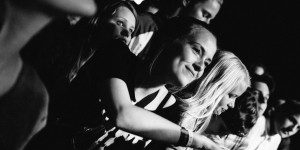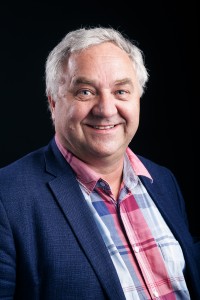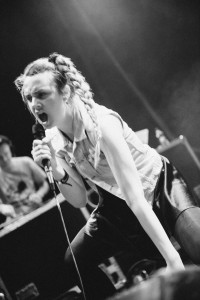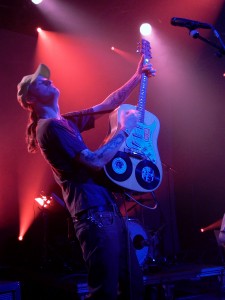By Daria Sukharchuk
We meet in his office at the SPOT headquarters, just off the street at Vester Allé. Gunnar’s office is tiny, with a big window opening to the street beneath, but the man behind the SPOT festival fills the room with stories about how the festival came to be what it is today.
Gunnar Madsen
This year marks the festival’s twentieth year and it has been held here in Aarhus since its third year. In that time, it’s gone from a small, local music festival with performances from a mere 32 bands, to a large-scale festival incorporating music, film and interactive and attracting an international audience. You just have to look at the numbers from last year when 125 bands played and the festival was host to around 350 industry representatives from 20 different countries, to understand why the festival is now spoken of as ‘the place to be’ for bands and their managers. Gunnar Madsen along with ROSA (The Danish Rock Council) have organised the festival since its second year so we asked him to tell us about the journey from the early days of the festival, to the festival as you see it today.
What was the initial idea behind SPOT Festival? Did you think that it would go on for twenty years?
“No, definitely not. Our initial idea was to make a kind of backstage environment for the music people and the musical cultural environment here in Denmark, and to promote what we considered important new talent that were not promoted by the industry,” says Gunnar.
The idea came about because as Gunnar explains, “in the early nineties the music industry was huge, in the world and in Denmark, they had their hands full of big, established projects, but nobody really put money into new acts and trends.” So SPOT Festival was organised as a way to promote this neglected ‘new talent,’ and Gunnar says, “we thought it was important work to do- that’s why we’re here.”
Gunnar and his team were also aware of the importance of promoting Danish and Scandinavian music internationally, since no one else seemed to be meeting this international challenge. “In the first years it was just fun: we invited, I think, 32 bands ‒ which was pretty hard at that time. We never planned for more than a year ahead at that time ‒ but as we grew, we realised that we needed a strategy.”
It was this strategy that was developed around SPOT number 7, that has taken the festival from a ‘fun’ festival to a serious platform for up and coming bands hoping to attract labels and international success.
Did you plan to have the festival in Aarhus from the very beginning?
“Aarhus was a very logical choice: people who have been in the business for long enough know that all major festivals have always been placed outside the capitals: the moment you try to make it in a big capital city, you fail.”
Aarhus – Denmark’s Liverpool
But more than that, Gunnar also says that “you can say that Aarhus has been Denmark’s Liverpool for many years, it has been the city from which the majority of good bands and artists have been raised.” This also means that there is a conducive atmosphere here in Aarhus, as there are “a lot of people who are used to working with music and institutions that are not afraid to do something different.”
What about the audience?
“From the very first days we invited British business people ‒ and made use of the local audience as a tool to support the bands in the form of an ‘audition stage.’” Gunnar explains that this is because the presence of a smaller local crowd “was a positive way to challenge the band to play their best when important business people were there. It was thought of as a pressure on the band ‒ but it was good when these business people came in and saw this up and
coming band playing for 300 people they would have a good impression.”
It’s important to note, though, that SPOT Festival doesn’t have aspirations to become like the big Danish festivals like Northside or Roskilde. “We don’t want to do music for the audience and put on a popular agenda or line-up because the most important thing for us is still creating a professionally interesting lineup,” Gunnar explains.
This presents its own challenges though as it becomes a “shifting balance between popularity and independence, which is rather difficult to strike. Most festivals start with buying big, established bands, and when they have that solid foundation, they buy a few smaller, newer bands. We do it the opposite way ‒ and that’s dangerous,” because as Gunnar explains “the greater part of the people buy into the music they know.” But SPOT still sticks to this formula
and starts “with new bands and then, in the very end, we have popular bands.”
SPOT Festival now works to promote bands across Europe, holding SPOT On Denmark events in places like Holland and Germany. In the past year they have held shows in Cologne, Eindhoven and Paris. SPOT also has a good partnership with Vienna.
We know that SPOT now has a “branch” in Vienna and other cities. Why there?
“If one of our bands generates interest outside Denmark, then we jump on the boat immediately. We guarantee to our guests from abroad that if they like some band, they can have it in their town within six months: we’ll raise the money and send the band. It proved to be a good strategy: we could provide our guests with something exact.” Gunnar is also keen to tell us that SPOT “has a very good partnership with Vienna: they wanted to bring some Nordic music to the city, so eventually we got a good grip on that area.”
So welcome to the festival that has remained true to its roots. In Gunnar’s words the festival is a ‘fun,’ practical “tool for promoting music” which now showcases film and interactive arts. Due to the purposefully small, ‘hygge´ environment of this festival you are participating in every artist and band’s road to success, so make sure you cheer loudly.
Daria Sukharchuk is a contributor for English language publication, Jutland Station. She is a Russian journalist, who has worked as a freelance journalist for Moscow-based online magazines W-O-S and Edutnaime.




